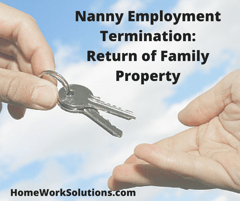Note: Special thanks to our guest blogger, Bob King, for his discussion below on nanny employment termination and the return of family property. Bob is an attorney and founder of Legally Nanny, the leading law firm providing legal and tax advice to household employers.
When a nanny and family part ways -- even amicably -- one item that's often overlooked in ending employment is returning the family's property. This is understandable particularly when the employment comes to an abrupt end with the family firing the nanny or the nanny quitting, and there seem to be so many other pressing issues involved such as arranging for continuing childcare.
 However, the return of a family's property is a critical element of ending the employment relationship. This return of property can include basic items like house, vehicle or other keys, debit or credit cards, membership cards for a local pool or clubhouse, or anything else that the family may have given to the nanny during her employment with the family.
However, the return of a family's property is a critical element of ending the employment relationship. This return of property can include basic items like house, vehicle or other keys, debit or credit cards, membership cards for a local pool or clubhouse, or anything else that the family may have given to the nanny during her employment with the family.
All of these items are the family's property and must be returned at the end of the employment relationship. Failure to do so could result in both civil and criminal charges.
Given the importance of returning property, families should always include this subject in their discussions with employees when terminating employment. Further, if the family is providing a severance to the nanny, it should have a severance agreement listing all the relevant terms of ending the employment relationship, including a promise that the nanny has returned all of the family's property and not kept any copies of anything.
If you would like additional information about this subject, please feel free to contact Legally Nanny at info@legallynanny.com or at 714-336.8864. Legally Nanny is pleased to offer complimentary initial consultations to Homework Solutions' clients.
~~~~~~~~~~
HomeWork Solutions Reminder: It is NEVER legal for the employer to withhold the final paycheck, whether family property has been returned or not. Most states regulate when final payment is due to an employee upon discharge.
~~~~~~~~~~
